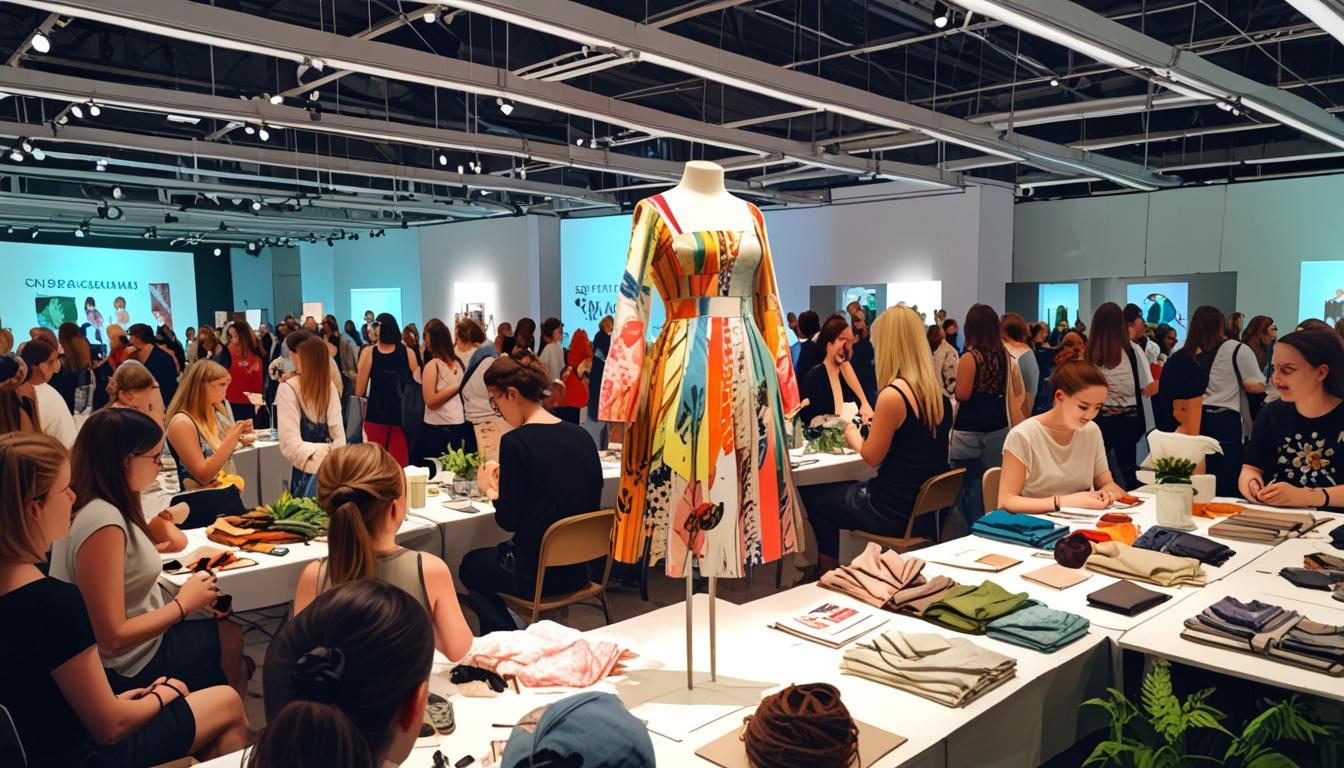Natalia Bertolo, a key player in the fashion industry, is on a mission to embed sustainability into the fabric of fashion design and production.
Natalia Bertolo, a prominent figure in the fashion industry, has dedicated her career to integrating sustainability into fashion design and consumption. Growing up in southern Brazil, an industrial hub known for its shoes and leather manufacturing, Bertolo was exposed to the world of fashion early in life. Her father, a sales representative for bags and travel accessories, took her to trade shows, fostering her interest in the industry. “It felt natural to develop an interest in fashion. Beyond that, I’ve always been drawn to the intersection of creativity and business; that’s the essence of fashion,” she shared.
Currently serving as the assistant country coordinator at Fashion Revolution, Bertolo is actively engaged in promoting conversations surrounding sustainable practices in the fashion sector. Her professional journey has encompassed various roles, including product development, buying, and operations, which have fueled her interest in the evolving nature of the industry. “Fashion never stands still,” she observed, emphasizing the need for constant adaptation and forward-thinking strategies.
Bertolo’s advocacy for sustainability extends beyond mere conversation; it is rooted in her belief that sustainable practices should be fundamental to every aspect of business. “Whether choosing suppliers, managing production, or considering a brand’s long-term impact, I have always weighed how decisions affect people and the planet,” she stated. This perspective is reflected in her university thesis from 2011, which focused on creating fashion collections grounded in sustainability, addressing the life cycle of products in design decisions.
Throughout her career, Bertolo has spearheaded several initiatives aimed at reducing fashion waste and encouraging responsible consumption. One notable project was the Fabric Forward: Reimagining Textile Waste exhibition, which brought together students, designers, artists, and industry professionals to explore innovative ways to repurpose textile waste. Additionally, she created the Costume Revolution project in collaboration with Splore, which raised awareness about the environmental impact of festival fashion through costume swaps, repair stations, and upcycling workshops.
Bertolo contends that consumer education is critical to fostering sustainable practices. “Consumers have more power than they realize. The way they choose to spend their money directly influences corporate decisions,” she remarked, emphasizing the importance of informed purchasing. However, she also noted that the responsibility for ethical practices does not rest solely on consumers. Brands must facilitate change by creating sustainable and affordable products. “Design, innovation, and transparency are huge in making that happen,” she stressed.
Turning her attention to gender representation within the industry, Bertolo highlighted the disparity in leadership roles. Despite the prevalence of female talent in fashion, leadership positions often remain largely occupied by men. She described her own experiences of needing to prove her expertise in spaces where her contributions were initially overlooked. Bertolo believes that overcoming such challenges can lead to personal growth. “When starting, it’s easy to doubt yourself or feel like you need to follow a traditional path, but the most exciting opportunities often come from putting yourself out there,” she reflected.
Bertolo’s insights not only shed light on the complexities of fashion but also illustrate her commitment to promoting a more equitable and sustainable industry. As she continues her journey, her work serves as an example of how fashion can be both innovative and responsible, paving the way for a new approach to consumerism and creativity within the sector.
Source: Noah Wire Services




?????????? ???????? ???? ??? ????????????? ? ??????? ?????? ?? ???? ???????. ???? ???????? ????????????? ????????? ????? ?????????, ???????? ?????????? ??? ????? ???????.
????????? ???????????? ????????? ????????? ????????. ??????????????? ???????????? ?????? ? ???????? ???????.
https://www.twitch.tv/stroikaru
???? ???????? ??? ??????? ???????. ??????? ????????? ?????? ?????? ??? ??????? ???????????? ???????.
????????? ? ???? ???????, ????? ???????? ???????.
This page you can locate special discount codes for a renowned betting brand.
The compilation of enticing deals is regularly updated to confirm that you always have entrance to the up-to-date deals.
With these special offers, you can economize considerably on your wagers and enhance your possibilities of triumph.
All voucher codes are precisely tested for genuineness and performance before showing up.
https://flc-auto.com/wp-content/pgs/lechenie_raka_molochnoy_ghelezy_v_polyshe.html
In addition, we present extensive details on how to utilize each enticing proposal to boost your bonuses.
Note that some bargains may have certain requirements or time limitations, so it’s fundamental to scrutinize carefully all the aspects before taking advantage of them.
Our platform provides a large selection of medical products for online purchase.
Users can quickly order needed prescriptions from anywhere.
Our inventory includes popular solutions and targeted therapies.
Everything is provided by trusted pharmacies.
nizagara for sale
We ensure user protection, with private checkout and prompt delivery.
Whether you’re treating a cold, you’ll find affordable choices here.
Start your order today and enjoy convenient online pharmacy service.
????? ?? ?????? ????? ????? ?????????.
?? ?????? ?????????????? ????????? ??? ???????????????? ?????, ????? ???? ???-?? ??????????.
?????? ??????? ??????? ??? ????? ????? ?? ????? ????.
???? ???
????????? HD-???????? ? ?????? ??????, ????? ??????? ?????????? ?????????????.
?? ?????? ?????????????? ? ????????? ???????? ??? ?????? ?????? ??????, ???????? ?? ????, ??? ??? ?????.
??? ?????? ?????? ????? — ?????????? ????????-?????????? ???? ?????????? ??????, ? ?? ??????? ????????????.
????? ?? ??????? ???????? ???????.
??????? ???????? ???, ??? ?????? 18.
? ??? ??????? ??????? ????? ????????.
????????? ?????????? ??????? ???????? ???????????.
????? ?????? ?????
???? ???????? ?????? ????? ????????.
????????????? ??????? ???????????.